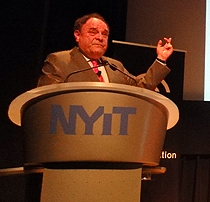Gil Schwartz, senior executive VP and chief communications officer for CBS, who writes for Fortune and elsewhere as "Stanley Bing," says using a pen name is "an honorable institution."
 |
He uses Bing for his Fortune column and 14 books but writes in Men’s Health and other media under his real name.
He and his secretary have handled numerous e-mails in recent weeks on the issue of whether his journalistic work disqualifies him to be a member of PR Society of America.
He was a Society member for one year only -- 2003 -- but did not renew. That membership would seem to invalidate the Society’s claim that it doesn’t allow press as members because, as Schwartz points out, his dual identity has been common knowledge since New York Times reporter Mark Landler revealed on Jan. 8, 1996.
Double Identity "Well Publicized"
Says Schwartz: "It has been well publicized since 1996 that Stanley Bing and I are the same person. Our opinion of people who have a problem with that fact has also been well publicized and need not be reiterated in a demure and tasteful venue like this one. Those who remain ignorant of this situation some 20 years in and dozens of exposes later clearly haven't been paying attention."
On May 2, 2014, Variety deputy editor Pat Saperstein, using a very large headline that said, "CBS Publicity Chief Gil Schwartz Moonlights as Business Author Stanley Bing," also saw the need to "out" him.
Schwartz defended his dual identity to Saperstein, saying, "All the superegos have alter egos. Using a pseudonym is an honorable institution."
What Do Corporate PR People Do?
Exploring this topic has put a focus on state of PR in corporations and institutions.
USA Today president and publisher Larry Kramer wrote April 13 that he worked alongside Schwartz for two years and "never saw Schwartz do any actual work. He was always at his desk on the phone or reading a newspaper or magazine. Every once in a while he had a guitar and would practice for a country music performance at a CBS meeting."
Schwartz, notes Kramer, was a "close consigliere to the most powerful man in media, CBS boss Leslie Moonves," who earned $65.4M in 2013, a package topped only by the $76.9M that Oracle's Larry Ellison took home. It was about five times the pay of the average S&P "500" CEO, noted Bloomberg.
"Frankly," wrote Kramer, "I never understood why Moonves kept Schwartz around, except for the fact that Moonves often needed someone to show up in his office with a 'crisis' as an excuse to get rid of some star begging for a spot in a new show."
We know Kramer is kidding around but those remarks resonated with us. Corporate PR staffs have been cut to the bone for decades. Management consultants said large corporate PR staffs were hotbeds of corporate politics and intrigue and either sent their occupants to different divisions or placed them under marketing or fired them.
Corporate Staffs Thin
Our experience, and that of New York Times columnist Dave Carr is that the few corporate PR people left act as barriers to execs and deliver "slop."
Most blue chips only offer a question box to reporters who show up at their sites. Reporters type in questions and hope for a response.
Schwartz says his staff is available 24/7 and is "the doorway to any inquiry or request for executive participation."
However, this was not the case when New York mag on May 14 embarked on an extensive examination of the false report about the attack on the U.S. embassy in Benghazi that was posted by "60 Minutes" reporter Lara Logan.
Wrote Joe Hagan: "Logan's flawed report is seen as the strongest evidence that the most celebrated news program in American TV history has lost its moorings under Fager, [executive producer Jeff Fager] tarnished by the kind of partisanship the network has been at pains to avoid since Rather's downfall."
There was no official help from CBS on the story which quoted numerous anonymous sources. Moonves, "through a spokesman (probably Schwartz) declined comment."
Schwartz Writes on Own Time
Schwartz says he writes in the morning, late at night and on trains and planes.
We knew numerous corporate PR executives for decades and one of their chores was assisting the CEO in travel. Typical chores were signing in the CEO at the front desk, making sure an elevator was waiting on the first floor, and having the right bottle of scotch, flowers, or whatever in the room.
They also served as a sounding board for the CEOs and gave them advice. But some corporate PR execs said they were never asked for advice. CEOs and other execs would give them items and stories to place, topics to investigate, and perhaps bad news about competitors to spread.
Schwartz Tells of “Extreme” Biz Travel
Exploring topics Schwartz is covering for Fortune, we accessed the June 30, 2014 column titled, "If it's Tuesday, this must be Brussels."
He tells of putting in a full day in the office in Los Angeles; flying with his "boss" (probably Moonves) to Amsterdam, arriving at 1 p.m. (3 a.m. by L.A. time); having lunch at a time normally four hours before breakfast, and going to dinners and a trip to an "enormous complex" outside Brussels where "the boss" gives a speech "which goes very well." At 5 p.m. local time he gets back on the Gulfstream 4 for the nearly 12 hour flight back to L.A. Time elapsed was from 72-96 hours (depending on how the hours are counted). Then he has to fly to New York.
Several drinks are consumed. "Lots of wine. Lots of martinis," he writes at one point. At another, he says they "return to the hotel for drinks, which come in waves."
The trip, says Schwartz, was an example of "extreme business travel." But he notes he has been "yanked around like a celebrity Chihuahua from one corner of the corporation to the other for years."
Cegielski Handles Queries at PRSA
Stephanie Cegielski, VP-PR at the PR Society, has by herself been handling numerous questions in recent weeks about Schwarz's membership, the finances of the Society, candidates for office, and the March 7 resignation of CEO Bill Murray effective June 1 after seven years at the Society. His contract ran to Dec. 31, 2014.
Her assistant, Rosanne Mottola, has not been involved. None of the elected officers has jumped in to help with numerous requests for information. Cegielski has two other staffers in the department but she will not reveal their names.
This is a very thin PR department for an organization with nearly 60 total staffers and an $10.9 million budget.
Cegielski succeeded VP-PR Arthur Yann, who died suddenly at the age of 48 on June 13, 2013.
Eight PR staffers have left the Society since 1996 -- Steve Erickson, Richard George, Libby Roberge, Joe DeRupo, Keith Trivitt, Cedric Bess, Janet Troy and Diane Gomez.
Careercast rates PR as the sixth most stressful job after military and enlisted personnel, firefighter, airline pilot and event coordinator. It has rated PR as high as the second most stressful job.


 Business leaders will face challenges in the upcoming year, some of which will come as a complete surprise, or beyond anyone's imagination.
Business leaders will face challenges in the upcoming year, some of which will come as a complete surprise, or beyond anyone's imagination. Teneo has hired Philipp Grontzki, who is a 20-year veteran of corporate communications and financial journalism, as a managing director in its strategy and communications group.
Teneo has hired Philipp Grontzki, who is a 20-year veteran of corporate communications and financial journalism, as a managing director in its strategy and communications group. Rowan Benecke, who co-founded Zeno Group and helmed Burson-Marsteller's tech practice, has joined McKinsey & Co as director of communications for North America.
Rowan Benecke, who co-founded Zeno Group and helmed Burson-Marsteller's tech practice, has joined McKinsey & Co as director of communications for North America. BCW has named Golin's Matt Coldagelli EVP and leader of its corporate affairs practice in Chicago.
BCW has named Golin's Matt Coldagelli EVP and leader of its corporate affairs practice in Chicago. Abby Bailey, who headed corporate communications for Fedex in its Middle East, India and Africa region, has joined Teneo as managing director in Dubai.
Abby Bailey, who headed corporate communications for Fedex in its Middle East, India and Africa region, has joined Teneo as managing director in Dubai.


 Have a comment? Send it to
Have a comment? Send it to 
No comments have been submitted for this story yet.